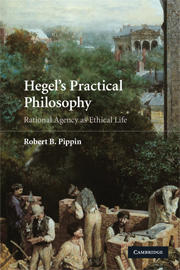8 - Recognition and politics
Published online by Cambridge University Press: 05 June 2012
Summary
RECOGNITIONAL DEPENDENCE:THE POLITICAL CLAIM
Hegel's theory of recognition amounts to an unusual social theory of subjectivity (an account of what it is to be an independent and dependent “I”) and therewith a social theory of freedom (an account of the form of social relations said to be necessary for an “I” to be the subject of deeds, an agent). I have been arguing that the full scope and ambition of Hegel's theory needs to be taken account of before its significance for a concrete social and political theory can be appreciated. I want in this chapter and in chapter 9 to make a start at least at spelling out those more concrete issues. I want to do so by means of a contrast, one that comes up very frequently in discussions of freedom in Hegel.
Most modern liberal versions of the state depend on a philosophically ambitious theory about the nature of human individuality and the normatively relevant implications of such individuality. It is often assumed that contrasting theories about the putative ultimacy of intersubjective relations and the derivative or secondary status of individuality are potentially if not actually illiberal, and Hegel's putative organic theory of the state is often cited as an example. A major arena for such disputes has been the claim by such neo-Hegelians as Charles Taylor and Axel Honneth that the key liberal notion of the free and rational individual depends for its possibility and rational sufficiency and empirical sustainability on a social condition of great political relevance: mutual recognition.
- Type
- Chapter
- Information
- Hegel's Practical PhilosophyRational Agency as Ethical Life, pp. 210 - 238Publisher: Cambridge University PressPrint publication year: 2008



